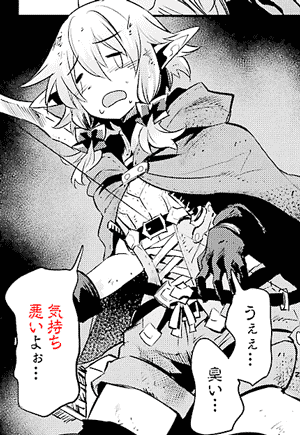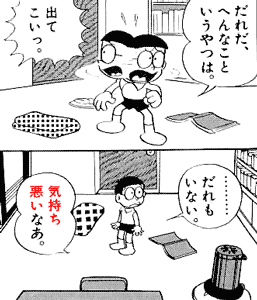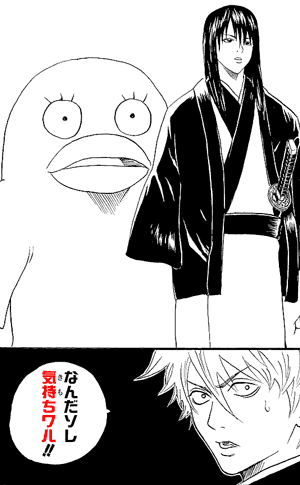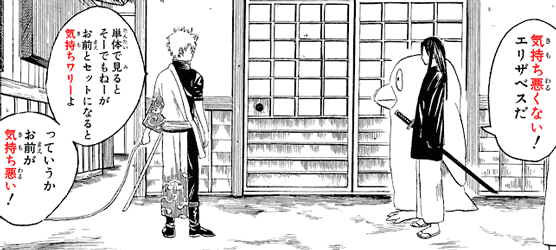Sometimes, kimochi warui is abbreviated to kimoi キモい.
And for the love of all that's holy do not search for 気持ち悪い on Google images. You don't want to do it. Trust me.
Manga: Goblin Slayer, ゴブリンスレイヤー (Chapter 6)
Grammar
The word kimochi warui 気持ち悪い means that something "feels bad." Literally, it's the word for "feeling," kimochi 気持ち, plus "bad," warui 悪い.The antonym, "feels good," is kimochi-ii 気持ちいい, since ii いい, "good," is the antonym of "bad," warui 悪い.
Note, however, that kimochi warui isn't a verb, "to feel bad," it's adjective, "that feels bad." Grammatically, kimochi warui is closer to "unpleasant" in English, but in practice it has the sense of "feels gross" or "feels creepy" most of the time.
Furthermore, from an English perspective, it's weird for an adjective to be alone in a sentence. Normally you don't say "fast," you say "it's fast." This is called a "dummy it." There's no "it" in Japanese, which is why kimochi warui is said alone in Japanese.
- kimochi warui! 気持ち悪い!
[It's] bad-feeling!
[It's] unpleasant!
[It's] gross!
[It's] creepy!
[It's] disgusting!
[It's] cringey!
[It feels bad]!
Usage
For reference, some examples of things that are kimochi warui 気持ち悪い."Gross"
Manga: Goblin Slayer, ゴブリンスレイヤー (Chapter 6)
- Context: you get used to it.
- uee...
うぇぇ・・・
Eeeeugh... - kusai...
臭い・・・
[It] stinks... (another adjective that gets translated like a verb.) - kimochi warui yoo...
気持ち悪いよぉ・・・
[This is] gross...
"Creepy"
Manga: Doraemon ドラえもん (Chapter 1)
- Context: Nobita hears a voice telling him things.
- dare da,
hen-na koto
iu yatsu wa.
だれだ、へんなこというやつは。
Who is it, the one [who] says weird things? - dete-koi'
出てこいっ。
[Show yourself]!- dete-koi 出て来い
(imperative form of.) - dete-kuru 出て来る
To leave and come. (i.e. to leave wherever they're hiding and come face Nobita.)
- dete-koi 出て来い
- .........dare mo inai.
・・・・・・・・・だれもいない。
.........there's nobody [here]. - kimochi warui naa.
気持ち悪いなあ。
[This is] unpleasant, uh.
[This is] creepy, uh.
"Disturbing"
Manga: Gintama 銀魂 (Chapter 20, 飼い主とペットは似る)
- Context: ⊂(◉ ө ◉)⊃
- nanda sore
kimochi waru!!
なんだそれ気持ちワル!!
What's that, [it's] disturbing!!
Conjugation
Since kimochi warui 気持ち悪い ends in an i-adjective, it can be inflected like an i-adjective.Kimochi Warukatta 気持ち悪かった
The word kimochi warukatta 気持ち悪かった is the past inflection: "felt bad," "was unpleasant," "was gross," "isn't creepy," "was disturbing." That is, it refers to something that was kimochi warui in the past.Kimochi Warukunai 気持ち悪くない
The word kimochi warukunai 気持ち悪くない is the negative inflection: doesn't feel bad," "isn't unpleasant," "isn't gross," "isn't creepy," "isn't disturbing."This is often used when someone calls something kimochi warui, and then the speaker, who has a... uh... *cough* peculiar *cough cough* taste, denies that it's kimochi warui.
Manga: Gintama 銀魂 (Chapter 20, 飼い主とペットは似る)
- kimochi warukunai!
Erizabesu da
気持ち悪くない!エリザベスだ
[It's] not disturbing! It's Elizabeth. - tantai de miru to
soo demo nee ga
単体で見るとそーでもねーが
If [you] look at it separately it's not so but- soo demo nee そーでもねー
sou demo nai そうでもない
It's not like that.
- soo demo nee そーでもねー
- omae to setto ni naru to
kimochi warii yo
お前とセットになると気持ちワリーよ
[when] it's in [accompanied by] you it's gross. - tteiuka
omae ga
kimochi warui!
っていうかお前が気持ち悪い!
Or rather you are gross!
Kimochi Waruku 気持ち悪く
The word kimochi waruku 気持ち悪く is the adverbial form of kimochi warui, which means it modifies verbs, actions, not nouns.Although, most of the time it's used with the verb naru なる, "to become."
- kimochi waruku naru
気持ち悪くなる
To become [so it's] unpleasant. - kimochi waruku natta
気持ち悪くなった
To have become [so it's] unpleasant.- i.e. "now it's starting to feel gross," and so on.
Kimochi Warukute 気持ち悪くて
The word kimochi warukute 気持ち悪くて is the te-form of kimochi warui. It's often used to say that something is so or something happens because it's kimochi warui. For example:- kimochi warukute haita
気持ち悪くて吐いた
[It's] gross [so I] vomited.
[I] felt bad [so I] vomited.- haku 吐く
To vomit.
- haku 吐く
- kimochi warukute hakisou
気持ち悪くて吐きそう
[I] feel bad [so it] seems [I will] vomit.
It's so gross I feel I'm going to vomit.
I feel so bad I feel I'm going to vomit.- hakisou 吐きそう
To seem like [I] will vomit.
(haku 吐く plus sou そう suffix.)
- hakisou 吐きそう
- kimochi warukute nerenai
気持ち悪くて寝れない
[It] feels bad [so I] can't sleep.
I'm not feeling well so I can't sleep.- nerenai 寝れない
(negative potential of) - neru 寝る
To sleep.
- nerenai 寝れない
Conversely, when you have something in the te-form connected to kimochi warui, it usually explains why it's kimochi warui:
- nurukute kimochiwarui
温くて気持ち悪い
It's lukewarm and gross.
It's gross [because] it's lukewarm.- nurui 温い
Lukewarm. (i-adjective.)
- nurui 温い
- nurunuru de kimochi warui
ヌルヌルで気持ち悪い
It's slimy and gross.
It's gross [because] it's slimy.- nurunuru ヌルヌル
Slimy. Slippery. (na-adjective and mimetic word.)
- nurunuru ヌルヌル
- tabesugite kimochi warui
食べすぎて気持ち悪い
[I] ate too much [now I] feel bad.- tabe-sugiru 食べ過ぎる
To eat too much. - taberu 食べる
To eat. - sugiru 過ぎる
To surpass. (normal verb.)
To do it too much. (auxiliary verb.)
- tabe-sugiru 食べ過ぎる




No comments: